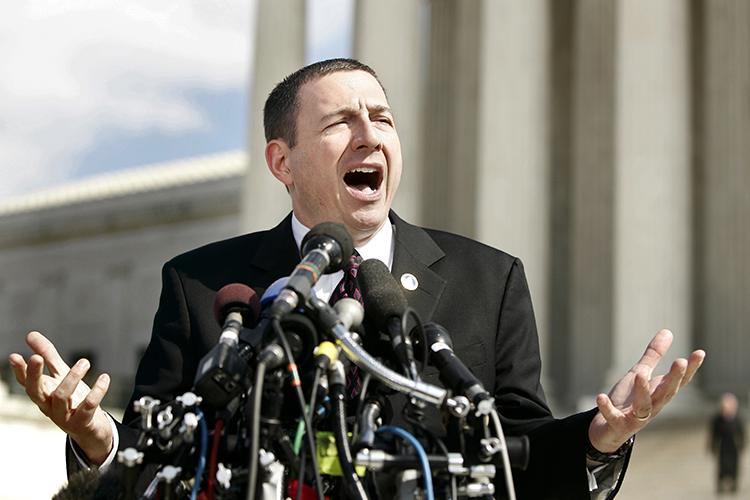SCOTUS legal counsel defends Alito dinner with evangelical couple, says leak report is 'uncorroborated'

The Rev. Rob Schenck speaks outside the U.S. Supreme Court building in 2005 after arguments were heard over two cases involving Ten Commandments displays in public courthouses. Photo by Gerald Herbert/The Associated Press.
The legal counsel for the U.S. Supreme Court is defending Justice Samuel Alito’s ethics following a report from the New York Times alleging that one of the justice's dinner companions later passed along information about the outcome of an upcoming Supreme Court decision to an anti-abortion crusader.
Legal counsel Ethan V. Torrey noted that Alito has said neither he nor his wife told evangelical couple Don and Gail Wright about the outcome of Burwell v. Hobby Lobby Stores or that he would be writing the opinion. Gail Wright also denied the allegation that she passed along the information to the Rev. Rob Schenck before the opinion favoring the religious rights of employers was released in June 2014.
Schenck’s allegations are “uncorroborated,” Torrey noted in the Nov. 28 letter.
Law360, the Associated Press, the New York Times and CNN are among the publications with coverage.
The Hobby Lobby decision exempted closely held corporations with religious objections from having to provide mandatory contraceptive coverage for employees. Although the Alitos and Wright denied leaking the opinion, the New York Times had reported that Schenck’s emails and conversations after the alleged leak indicated that he was aware that Alito would be writing the decision and that it favored the retail company.
The Wrights were donors to Schenck’s evangelical group. They also were active in the Supreme Court Historical Society, which is how the Alitos became acquainted with the Wrights, Torrey said.
“There is nothing to suggest that Justice Alito’s actions violated ethics standards,” Torrey wrote.
The Wrights owned a real estate business in Dayton, Ohio, “and to our knowledge, they have never had a financial interest in a matter before the court,” Torrey said.
Torrey noted that Judicial Conference gift regulations say judges can’t accept gifts from people seeking action by the judge or whose interests may be substantially affected by a judge’s duties—with some exceptions. The word “gift” is defined to exclude social hospitality based on personal relationships and modest items, such as food and refreshments. The Alitos did not receive reportable gifts from the Wrights, Torrey said.
The letter was addressed to Democratic Sen. Sheldon Whitehouse of Rhode Island and Democratic U.S. Rep. Henry C. Johnson Jr. of Georgia. They chair judiciary subcommittees in the U.S. Senate and the U.S. House of Representatives.
Whitehouse and Johnson said in a Nov. 29 press release Torrey’s response “reiterated Justice Alito’s denials but did not substantively answer any of our questions.”
The lawmakers had asked whether the Supreme Court had opened an investigation into efforts to influence the justices by Schenck’s group, which is said to have counseled wealthy volunteers to entertain the justices while pushing conservative positions, without commenting on specific cases.
The lawmakers also asked whether the high court has reevaluated its practices, procedures or rules regarding judicial ethics and the justices’ receipts and reporting of gifts. The lawmakers also wanted to know who is responsible for policing the relationship between the Supreme Court and the Supreme Court Historical Society to ensure that the society is not used to gain undue influence.
Write a letter to the editor, share a story tip or update, or report an error.



